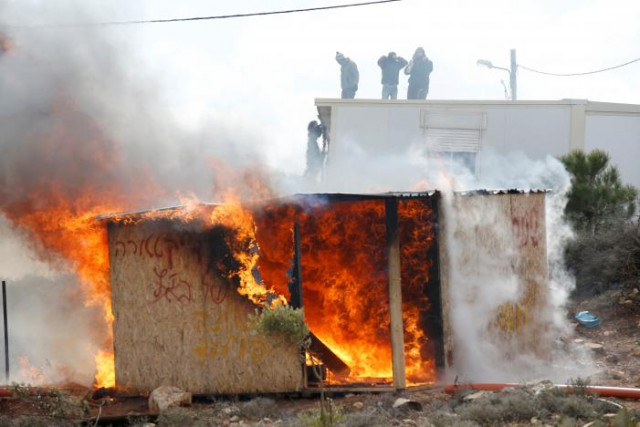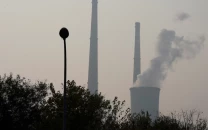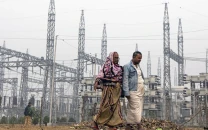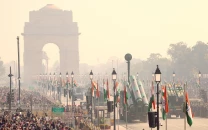Israeli forces begin operation to evict settlers from illegal outpost
Most countries consider settlements illegal and an obstacle to peace.

Protesters stand atop a roof as a shed burns during an eviction by Israeli police of residents from the Israeli settler outpost of Amona in the occupied West Bank February 1, 2017. PHOTO: REUTERS
Settlers and dozens of pro-settlement activists who flocked to the Amona outpost to protest against the evacuation burned tyres and piled makeshift barricades at its entrance. But there was no immediate violence as columns of unarmed police walked towards prefabricated homes where some 330 settlers live.
Several families with small children walked out of the outpost minutes before the operation began. But others said they would stay put and peacefully resist eviction. "We won't leave out homes on our own. Pull us out, and we'll go," Avihai Bavaron, one of the outpost's leaders, told reporters. "It is a black day for Zionism."
Nawaz, Abbas press talk: Quick solution to Israel-Palestine conflict urged
Hours before the police operation, Israel announced plans for 3,000 more settlement homes in the West Bank, the third such declaration in eleven days since US President Donald Trump took office. Trump has signalled he could be more accommodating toward such projects than his predecessor Barack Obama.
An announcement a week ago by Israel that it would build some 2,500 more homes in the West Bank, territory captured in a 1967 Middle East war, drew rebukes from the Palestinians and from the EU. It followed approval of more than 560 new homes in East Jerusalem days before.
Palestinians want the West Bank and Gaza Strip for an independent state, with its capital in East Jerusalem. Israeli troops and settlers withdrew from Gaza in 2005. The legal battle over Amona has dragged on for eight years. Under the latest Supreme Court ruling, it had to be evacuated by February 8.
In 2006 Amona saw a violent partial eviction, with nine shacks torn down by authorities. Police were confronted by thousands of settlers and more than 200 people were injured. Most countries consider settlements illegal and an obstacle to peace, as they fragment territory Palestinians seek for a viable state.
Israel municipality approves hundreds of settlement homes in east Jerusalem
Israel disagrees, citing historical and political links to the land - which the Palestinians also assert - as well as security interests. The Israeli parliament is due to vote next week on a law that would retroactively legalise dozens of outposts built on privately owned Palestinian land without government authorisation. Backed by the Israeli government but described as unconstitutional by the attorney-general, the bill is expected to pass.
Legal experts said, however, it would not survive any challenge in the Supreme Court. Outposts usually start with pre-fabricated huts on remote hilltops, lived in by a handful of settlers. Over time, they acquire Israeli military protection and hook up to water and electricity networks, slowly becoming more formalised.


















COMMENTS
Comments are moderated and generally will be posted if they are on-topic and not abusive.
For more information, please see our Comments FAQ